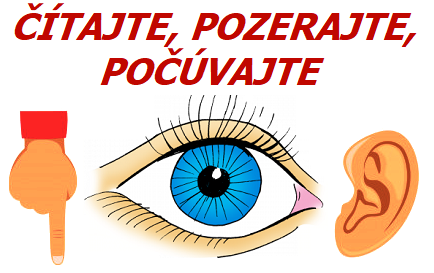19 Multikultúrna spoločnosť - MULTICULTURAL SOCIETY :)
Vytvorené: 18. 10. 2014 Tlačiť
a) Holidays, customs and traditions (religious and public holidays, national traditions and various events)
There are many holidays which we celebrate during the year in our country. People generally look forward to holidays because they don´t have to go to work or to school. Holidays can be divided into religious and public holidays. To give an example of public holidays, we can mention the first of January when we celebrate the establishment of the Slovak Republic. The first of September is the Day of the Constitution of the Slovak Republic.
The most important religious holidays are Christmas and Easter. The Christians celebrate the birth of Jesus at Christmas. Among children, Christmas is the most exciting time. In Slovakia, Christmas celebrations begin with Advent. People make or buy an Advent wreath with four candles. On each of the four Sundays during Advent, a new candle is lit. During Advent there are lots of preparations to be made for Christmas. They include cleaning the house, baking and buying the Christmas Tree. Christmas carols are sung everywhere, people buy presents and send postcards to their relatives and friends. On December 6th we celebrate St. Nicholas Day. Young children place their shoes near the door or window, so that St. Nicholas could fill them with sweets and fruit. On Christmas Eve mothers prepare the traditional Christmas dinner: sauerkraut or lentil soup for the first course and carp and potato salad for the second course. There are a lot of cakes and pastries as well as fruit. After dinner the whole family goes to the Christmas tree to see and open the presents. The Christians often go to church later in the evening for a midnight mass.
Easter is another important religious holiday which we celebrate in spring. Christians celebrate the resurrection of Jesus. The period of 40 days before Easter is called Lent. On Easter Monday, men and boys go from house to house and whip women with a stick made of woven willows. The men also pour cold water on women, so that they could remain young and beautiful in the next year. Women and girls give them a ribbon on the whip and decorated eggs. The eggs symbolize new life.
Our country is rich in cultural traditions and customs. Slovaks have passed their folk songs, music and dance from generation to generation. There are many folk groups keeping and representing these traditions. The most famous are Sľuk and Lúčnica. The Slovak folklore can be seen on regular folk festivals. Východná is an international folk festival where everybody can discover beauties of our traditional folk customs and traditions.
b) The coexistence of various ethnic groups in one country
In every country there is the majority of people living there as well as some minorities. Apart from Slovaks, our territory is inhabited by over half a million Hungarians in the south The Roma are the second-largest ethnic minority in Slovakia and they live mostly in the eastern parts of the country.A rapidly rising birth rate among the Roma means an increasingly important issue in Slovak politics and Slovak government is working hard to integrate them into society.The Roma population is often a victim of racist attacks. There are also smaller ethnic minorities like the Ruthenians in the east, Vietnamese, Jews or Carpathian German people. At present the country faces the problem of Vietnamese guest workers and helps the refugees from Albania and Ukraine.
c) Bringing cultures together (contacts in the past and at present), personal contact with other cultures, tolerance
There weren´t many people of different races and cultures in our country. This situation has changed since 1989. Many foreigners are coming to our country and we are getting used to the idea that it is normal that people are of different colour of the skin. We should try to bring people of different nationalities and races together. We all need to live and work together peacefully. The most important attitudes towards other people are tolerance and respect. Multicultural education is of great importance. It prepares us for living in a multicultural society and it helps us to be educated in more ways. We can learn about different cultures, we can learn about their traditions and holidays. This knowledge can also help us to overcome misunderstandings and problems between people of different races and nationalities.
d) Negative phenomena (racial discrimination, intolerance, relations with minorities)
The lack of understanding and tolerance can cause isolation of minorities. This can lead to xenophobia or racial discrimination. Some people often have prejudices concerning people from different cultures. People of other colour of skin have problems with finding a job. Sometimes they are even physically attacked. Racists consider just white colour of skin for „the right“ and people with other colour of skin are inferior for them.
e) Cultural values of other nationalities, coexistence in Europe
Cultural and religious diversity has for a long time been a matter of lived reality in European societies. The world is full of diversity and that is the beauty of our universe. If there had not been any diversity, the world would appear boring and unattractive.Lack of tolerance leads to fighting, violence, and finally it destroys the peace and security of every society. Without tolerance and harmony the lasting peace of Europe cannot be maintained.
![]()
· Simulácie z fyziky· O Slovensku po slovensky· Slovenské kroje· Kurz národopisu· Diela maliarov· Kontrolné otázky, Domáce úlohy, E-testy - Priemysel· Odborné obrázkové slovníky· Poradňa žiadaného učiteľa· Rýchlokurz Angličtiny. Rozprávky (v mp3)· PREHĽADY (PRIBUDLO, ČO JE NOVÉ?)Seriály:· História sveta (1÷6)· História Slovenska (1÷5)· História módy (1÷5).
Členstvo na portáli
Poznámka pre autora
Copyright © 2013-2026 Wesline, s.r.o. Všetky práva vyhradené. Mapa stránky ako tabuľka | Kurzy | Prehľady |






